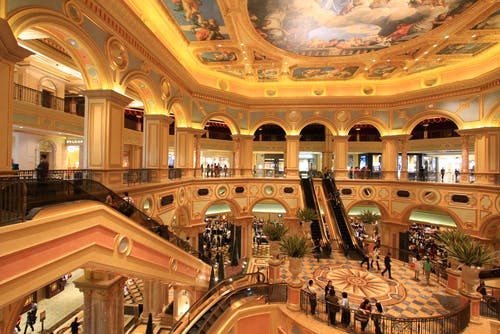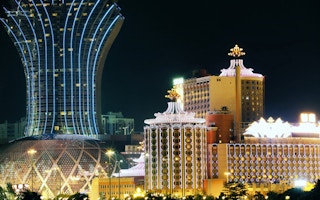Beside the behemoth that is China is the small special administrative region of Macao, known largely for its tourism and casino sectors – not its sustainability expertise. But like the little engine that could, Macao wants to take a stand for the environment, urging for its protection through greater public awareness and increased collaboration among companies and countries.
The Government of the Macao Special Administrative Region (Macao SAR) has initiated the Macao International Environmental Co-operation Forum and Exhibition (MIECF) in this regard. A forum, trade fair and public campaign all rolled into one, the 2014 MIECF is set to take place on March 27 to 29 at the The Venetian Macao-Resort-Hotel, where over 6,000 participants from 50-plus countries are expected to attend.
This is the seventh edition of the event, and the theme focuses on “Energizing Green Business Growth: Thinking Green, Going Green, Living Cool”.
In an interview with Eco-Business, the MIECF organisers said plenty of green business opportunities await in Macao, especially in the tourism and hospitality industries. “Many local firms and those from outside are interested in providing green technologies that support these industries,” they added.
The casino sector alone earned 360.7 billion patacas or US$45.2 billion last year, according to the Gaming Inspection and Coordination Bureau of Macao SAR. Macao is the only place in China where gambling is legal. Compared to the Las Vegas strip in the US, Macao earned seven times more in the same period of 2013, reported the Wall Street Journal.
“
The lighting of advertising signs on the streets, decorative lighting on exterior walls of buildings, large-screen displays and landscape lighting, all contribute to light pollution and energy over-consumption
MIECF organisers
“The Macao SAR Government encourages Macao’s hotel industry to implement environmental measures,” said the organisers. In particular, “the lighting of advertising signs on the streets, decorative lighting on exterior walls of buildings, large-screen displays and landscape lighting, all contribute to light pollution and energy over-consumption”, they pointed out. This is on top off other pressing environmental problems Macao is facing, such as regional air pollution, that is in part due to rising number of vehicles in Macao, and water quality and security, they added.
To help address these and assist the industries in becoming more sustainable, MIECF has a Green Matching service – one of the many highlights in the event’s program – that will allow firms, such as hotel companies, to connect with other businesses to create ways for them to operate better. For example, firms can purchase responsibly made materials or opt for new technologies that enhance efficiency. “Over 400 business matching sessions were arranged for local hotels alone at last year’s MIECF, which shows how big the market demand is,” the MIECF team noted.
At the Green Forum, another feature of the MIECF, which presents international speakers, sustainability experts and policymakers specialising in different sectors, there is also a session on eco-tourism called “Corporate Social Responsibility and the Visitor Economy”, which is co-organised by the Pacific Asia Travel Association or PATA, a non-profit travel trade group. Hospitality firms interested in going green can listen to the best practices of socially responsible leaders, such as Cindy Ortega, the chief sustainability officer of MGM Resorts International, said the organisers.

The 2014 MIECF will be held at The Venetian Macao-Resort-Hotel. Image: SASIMOTO / Shutterstock.com
One of the primary advantages of this eco-convention is how it offers local companies the opportunity to extend their market reach to other areas in the region, specifically the Pan-Pearl River Delta, and to other countries, especially to Portuguese-speaking nations since Macao is a former Portuguese colony. The Pan-Pearl River Delta is a burgeoning region in China that accounts for 20 per cent of its total area, composed of southern provinces, namely Guangdong, Fujian, Jiangxi, Hunan, Guangxi, Hainan, Sichuan, Guizhou and Yunnan, together with the two Special Administrative Regions of Hong Kong and Macao. Aside from this growing industry, the MIECF also plans to boost other businesses in Macao. “There are hundreds of companies in Macao which are engaged in green industries and they are involved in a wide spectrum of sectors such as energy efficiency, renewable energy, green building, green mobility, waste and water management solutions, and environmental services, which are in line with MIECF’s exhibit categories,” the organisers explained.
“MIECF’s objective is to continue to promote Macao’s role as an environmental protection platform between the Pan-Pearl River Delta and other countries of the world,” the organisers underscored.
Alongside business collaborations, the MIECF and the Macao government also intend to stimulate dialogue and exchanges in how to build a sustainable city and develop a low-carbon future, they added.
Among the long list of speakers, the keynote speeches will be given by Professor Joseph Stiglitz, a recipient of the Nobel Memorial Prize in Economic Sciences and a former chief economist at the World Bank, and James Jao, president of the architectural and urban planning firm Long On Group and a senior expert on planning under the State Administration of Foreign Experts Affairs of the People’s Republic of China.
“
MIECF’s objective is to continue to promote Macao’s role as an environmental protection platform between the Pan-Pearl River Delta and other countries of the world
MIECF organisers
Jao, who was recently interviewed by Eco-Business, will talk about the Three-Star green building certification in China. His goal is to encourage more international companies to build more sustainably, just as he worked with BP, IBM, Intel and Dow Chemical to achieve sustainable design in China.
If previously China pursued GDP growth without considering protecting its natural resources, China is now taking “responsibility of being a stakeholder on this planet”, he said.
A Green Public Day is part of the MIECF festivities. Set on the last day of the event, it is intended to generate greater awareness on environmental issues, since “environmental protection is a relatively new concept in Macao”, noted the organisers. There will be a workshop, a green tour, and a green bazaar, among other activities.
One of the key initiatives under this public-directed effort also is the recently expanded list of ‘Suggested Environmental Standards’ created by Macao’s Environmental Protection Bureau. This list, covering 80 products from stationery to water-saving items and eco-friendly toys, promotes green purchasing and consumption, which is also about supporting manufacturing practices that are less impactful on the environment.
For more information on the 2014 Macao International Environmental Co-operation Forum and Exhibition, please visit this site.

















